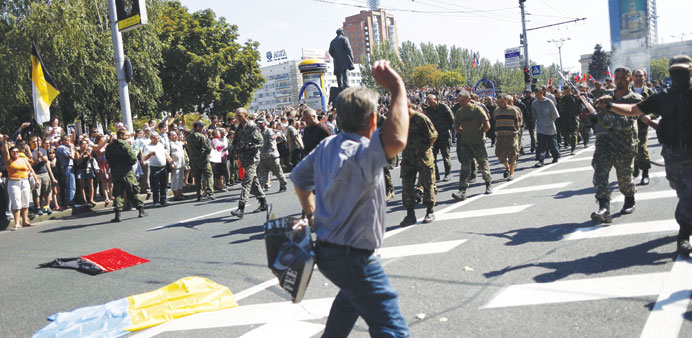AFP/Reuters/Donetsk
Pro-Russian rebels in eastern Ukraine paraded dozens of captured soldiers before a jeering crowd yesterday in mockery of Independence Day celebrations in the capital.
Ukraine’s pro-Western government had sought to boost morale with an upbeat military parade to mark the country’s independence from the Soviet Union in 1991.
Speaking to a crowd of thousands in the iconic Independence Square, known locally as the Maidan, President Petro Poroshenko decried Russian “aggression” and said he was “convinced that the battle for Ukraine, for independence, will be our success”.
But it was markedly different scene in the eastern rebel stronghold of Donetsk, where around 40 or 50 captured government soldiers were paraded through the city’s central Lenin Square as onlookers hurled garbage and empty bottles at them.
They looked dirty and unshaven and bowed their heads as they passed.
Some had bandaged arms and heads.
They were guarded by rebel fighters with guns, their bayonets fixed.
Two street-cleaning machines followed the column, spraying water on to the street in a theatrical gesture to indicate the men were unclean.
“You are killing children!” screamed some in the crowd at the prisoners, who were later placed on two buses and taken to an unknown destination.
The grim scene appeared designed to recall the famous moment in 1944 when thousands of captured Nazi soldiers were paraded through Moscow on Stalin’s orders.
Human Rights Watch (HRW) deputy director Rachel Denber said on Twitter that the event amounted to “humiliating and degrading treatment” of prisoners and was therefore in breach of the Geneva Convention.
Ukraine and the West blame Russia for supporting the separatist insurgents still clinging on to territory after four months of fighting in the restive east.
“War has come to us from over the horizon where it was never expected,” Poroshenko told the crowd in the Maidan, many of whom sported the blue and yellow national colours and traditional dress as they celebrated the first military parade in five years.
The president said that some of the equipment rolling through the Maidan, which included tanks and Grad missile systems – controversial for the indiscriminate damage they have caused in the east – would be sent straight back to the front lines after the display.
“In the 21st century, in the centre of Europe, there is a flagrant attempt to breach the border of a sovereign state without declaring war,” he said. “It is as if the world has returned to the 1930s, the eve of World War II.”
Poroshenko pledged 40bn hryvnias ($3bn, €2.3bn) to its cash-strapped army over the next three years for the purchase of warplanes, warships and helicopters.
He called it “only the modest beginning” of the rebirth of the Ukrainian military.
“It is clear that in the foreseeable future, unfortunately, a constant military threat will hang over Ukraine. And we need to learn not only to live with this, but also to be always prepared to defend the independence of our country,” he said.
Kiev’s conflict with the pro-Russian rebels in the separatist regions of Luhansk and Donetsk has claimed more than 2,200 lives since April.
There is mounting concern over civilian casualties as the government presses closer into the rebel’s last redoubts.
A shell hit one of Donetsk’s largest hospitals yesterday, sending patients and staff fleeing to the basement.
“We heard explosions at 6.30am, windows broke and doctors told us to leave our rooms to go down here,” said one young man in the basement of the surgery ward, who added that he was a Ukrainian soldier injured earlier in the week and now awaiting a prisoner swap.
On Saturday, shelling in Donetsk residential neighbourhoods killed six civilians, including a child.
Human rights organisations have said both sides of the conflict are guilty of using indiscriminate weapons and urged against locating military targets in urban areas.
A number of Western leaders, including US President Barack Obama, congratulated Ukraine on Independence Day and Pope Francis extended a message of peace.
He called for prayers to Ukraine’s “sons and daughters, to their aspirations of peace and tranquility, threatened by a situation of tension and conflict that continues unabated, causing so much suffering for the population”.
Ukraine’s leader is under pressure to forge some form of agreement with Russia’s President Vladimir Putin when they meet alongside EU officials in Minsk tomorrow.
German Chancellor Angela Merkel, who visited Kiev on Saturday to try to lay the ground-work for a peace deal, said that tomorrow’s talks were unlikely to produce a breakthrough.
The European Union’s chief diplomat, Catherine Ashton, will be at the meeting to help mediate.
Yesterday Ashton said that the meeting provided “an opportunity we should not miss”.
Earlier this week Moscow set off alarm bells by driving in a convoy of more than 200 trucks in a unilateral aid mission to war-torn Luhansk, where people had been without power or communication for three weeks.
Kiev criticised the move as a “direct invasion” and said that its border officials were kept away from checking the contents of most lorries amid fears the convoy would help bolster the rebels.
International monitors said on Saturday that the trucks had all returned to Russian territory, but Kiev accused them of looting valuable military equipment from a factory and smuggling it from the country.

A man aims a projectile yesterday as captured Ukrainian soldiers walk on Lenin Square in Donetsk, during a parade in mockery of the country’s Independ
